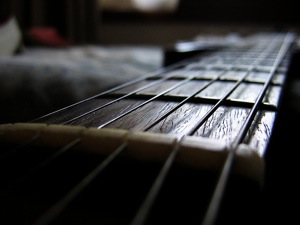A Nashville guitar maker wakes up in a sweat after this recurring nightmare. He knows that some of those guitars the rock stars smashed 30 years ago were classics produced by Gibson Guitar Corp. Today those same instruments would be worth six, seven, eight thousand dollars — if they were still in one piece.
For guitar collectors, it’s more than just the dollar value that makes a vintage Gibson a source of awe. It’s more than the fact that consummate craftsmanship and innovation make them ultimately playable and as handsome as a work of art. It’s about aura. Chuck Berry, Eric Clapton and Lenny Kravitz have contributed to the legend, recording hits with Gibson electrics. Charlie Christian ushered in the age of electric jazz guitar on an ES-250; Robert Johnson created a body of near-mystical blues recordings on Gibson-made acoustics; the bluegrass banjo licks on Flatt and Scruggs’ “Foggy Mountain Breakdown (used in the film Bonnie and Clyde) were played on a Granada banjo, created by Gibson.
The Gibson Bluegrass Showcase, the only Gibson facility in Nashville open to the public, is the place to watch luthiers (makers of guitars, mandolins, banjos and anything else with strings) actually creating world-class instruments. the headquarters of Gibson’s Original Acoustic Instruments manufacturing division, this all-in-one facility features everything from a retail store full of guitars and Gibson wear to a performance venue where today’s guitars gods make those Gibsons sing. It’s a true mecca for guitar freaks.
On the other hand, rockers should head to Memphis, where another Gibson facility, The Gibson Memphis Showcase, busily cranks out the “ES” line of electric guitars, from the classic series led by Les Paul to the “Lucille” model used by B.B. King. Factory tours are also available in the Memphis facility, which has a lounge where artists plug in the Gibson SGs and Les Paul Customs and turn up to 11. Also at the Gibson Memphis Showcase is the Smithsonian Rock ’n’ Soul Museum, a tribute to the long list of rock acts that helped put Gibson on the musical map and made guitar strumming a national pastime.
If Gibson epitomizes the Spirit of American music, the company’s home, Tennessee, is the nexus of instrument makers and music-obsessed fans, a magnet that draws luthiers and laypersons in equal measures. You can’t throw a guitar pick without hitting a guitar maker in Nashville, and while only folks in the industry might recognize the names of respected independent makers — Marty Lanham, Mark Taylor, Mark Lacey — their client list comprises the biggest names in the biz, from Aerosmith to Garth Brooks.
Marty Lanham, the man behind Nashville Guitar Company, found his way to Music City in 1972. “I was looking for a place to live where music was as much a part of the culture as it was to my life,” he says. “It was clear to me that playing banjos and guitars, fixing and building them, was what I wanted to do with my life.” It’s not unusual for a Nashville guitar maker to speak of his profession, as Lanham does, in terms of a calling, not just a gig.
Mark Lacey is another dedicated builder who couldn’t resist the lure of Nashville. “In 1981, following a job offer, I moved to Nashville to work as a repairman for vintage expert and dealer George Gruhn,” Lacey recalls. “It was here that I was first exposed to older archtop and flat-top guitars, having the opportunity to examine them in detail.”
Lacey points out an incontrovertible fact about guitar culture in Nashville: working as a luthier in Music City is always a learning experience. And it’s no coincidence that both Lacey and Lanham began their stints in Nashville working for George Gruhn. This is another fact about Nashville: All roads lead to Gruhn.
Gruhn Guitars, which sits in the shadow of Ryman Auditorium, birthplace of the Grand Ole Opry, is a repository of some of the finest banjos, mandolins, and, naturally, guitars. Not just a showroom for delectable vintage plectrums, it’s a prime outlet for active builders and a repair facility nonpareil. Since 1970, the showroom has been a home for talented craftsmen and a way station for makers looking to start their own companies.
George Gruhn talks about guitars with the reverence of a biblical scholar. “Guitars, which are the ultimate collectible, can be looked at, touched, listened to and played,” he says. “At the same time, they are beautiful pieces of art that can be appreciated on so many levels. A guitar responds to the individual player and sounds completely different when you play it than when you listen to someone else play it. There is, therefore, greater depth of appreciation with musical instruments than with almost any other collectible, perhaps even more than with painting and sculpture.”
Guitar aficionados and music fans in general can get a taste of Tennessee’s musical heritage by touring attractions such as Sun Studio in Memphis and Nashville’s Country Music Hall of Fame. The first time you catch yourself looking the the logo of the guitar in the Elvis photo, you’ll know you’ve got guitar fever, and no better place to get it than Tennessee.
And when you see those clips on MTV where the big-haired guitar hero plays a solo amid blazing fireworks, remember that the source of that instrument in their hands may well be some dedicated luthier in Nashville. “I guess, like most other full-time builders, I am hooked on building guitars,” Mark Lacey concludes. “I get a great sense of achievement in creating a musical instrument from scratch. The best part is hearing your guitars played really well by talented players.”
As long as they’re not Pete Townshend.
(Published in Tennessee magazine)





photo courtesy of RedGlow82